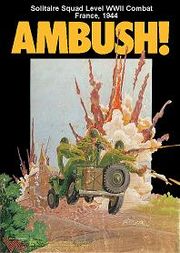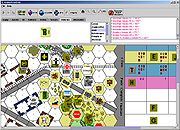
Ambush!
Encyclopedia

Wargaming
A wargame is a strategy game that deals with military operations of various types, real or fictional. Wargaming is the hobby dedicated to the play of such games, which can also be called conflict simulations, or consims for short. When used professionally to study warfare, it is generally known as...
developed by Avalon Hill
Avalon Hill
Avalon Hill was a game company that specialized in wargames and strategic board games. Its logo contained its initials "AH", and it was often referred to by this abbreviation. It also published the occasional miniature wargaming rules, role-playing game, and had a popular line of sports simulations...
. It was released under Avalon's Victory Games label and was developed by Eric Lee Smith and John Butterfield. In 1984, Ambush! won the Origins Award
Origins Award
The Origins Awards are American awards for outstanding work in the game industry. They are presented by the Academy of Adventure Gaming Arts and Design at the Origins Game Fair on an annual basis for the previous year, so the 1979 awards were given at the 1980 Origins.The Origins Award is commonly...
for Best 20th Century Boardgame of 1983. It has been out of print since Avalon Hill was disbanded in 1998.
Ambush! was innovative when it was released in 1983 since it was exclusively designed for single player play. Up to that point, wargames generally required at least two players. This was necessary since a player always had to play and control the opponent. Ambush! solved this problem by having the game scenario itself control the opponent. It accomplished this via tables, charts and a "paragraph book" which the player referred to see how the opponent was reacting.
Having the scenario dictate the actions of the opponent had another advantage: perfectly hiding the enemy. In all previous board based wargames, chits
Chit (board wargames)
Chits are a type of wargame counter that are generally not directly representational but used for the following purposes:* Tracking, being placed on a numeric runner to indicate turn status, as in some rule variants for Squad Leader...
or markers had to be placed on the board representing enemy units. Some chits contained question marks or otherwise hid what was actually on the space, but the opposing player knew where likely areas for the enemy were. With Ambush!, the enemy had no markers on the board at all until they became visible (usually by attacking the player).
One drawback of Ambush!'s design was that it was difficult for players to create their own scenarios. Since each scenario had its own complex set of charts and tables, each cross-referenced to sections in the paragraph book, creating a scenario for the game from scratch could be a daunting undertaking. Players, then, were usually required to purchase Avalon Hill's expansion modules in order to play additional scenarios.
Ambush! could also be played with more than one player, with players playing in different squads or controlling different soldiers.
Expansions
Ambush! spawned several expansion modules:- Move Out (1984)
- Purple Heart (1985)
- Silver Star (1987)
There was also a Japanese theatre version of Ambush! called Battle Hymn, which had one expansion module called Leatherneck.
Additionally, a solitaire game based on Ambush! called Open Fire! was released by Victory Games, which put the player in command of US tanks in WW II; it was less successful and had a less elegant design.
There was, finally, a two-player version of Ambush called Shell Shock released in 1990.

Computer versions
There have been a number of literal translations of Ambush! to the computer, including a cyberbox module as well as at least one version for the VASSALVASSAL Engine
The VASSAL Engine is a game engine for building and playing online adaptations of board games, tabletop games and card games. It allows users to play in real time over a live Internet connection, and also by email . It runs on all platforms, and is free, open-source software...
game engine
Game engine
A game engine is a system designed for the creation and development of video games. There are many game engines that are designed to work on video game consoles and personal computers...
.
Legacy
While not the first boxed solitaire board wargameSolitaire board wargame
Board wargaming in the modern, commercial sense have generally concentrated on gameplay designed for two or more participants. While playing solitaire is possible with any game, it is generally done so as an exercise in analysis rather than for enjoyment.-History:Commercial solitaire wargames...
to be produced (Avalon Hill's B-17, Queen of the Skies
B-17, Queen of the Skies
B-17, Queen of the Skies is a solitaire board wargame published in the US in 1983 by Avalon Hill and is a simulation of the experiences of a single B-17F Flying Fortress Bomber flying with the 8th Air Force in World War 2...
had preceded it in 1983), Ambush! was probably the most successful. While the additional modules are testament to this successful design, the concept also appears to have been validated by Ambush!, as a fair number of other purpose-designed solitaire games (as opposed to two player games that "could" be played solitaire) followed it shortly after. These include:
- Tokyo Express (Victory Games, 1988)
- Open Fire (Victory Games, 1988)
- London's Burning (Avalon Hill) - a solitaire game of the Battle of Britain
- Solitaire Advanced Squad Leader (Avalon Hill, 1995)

